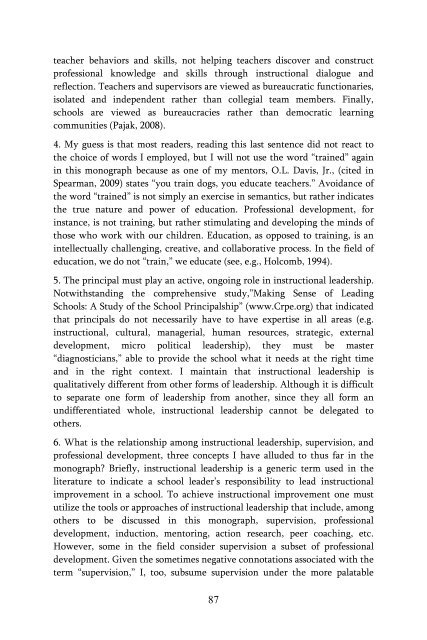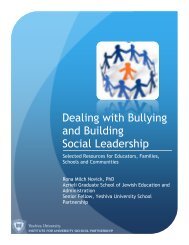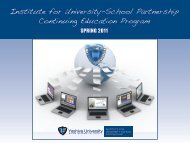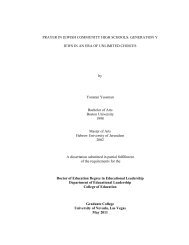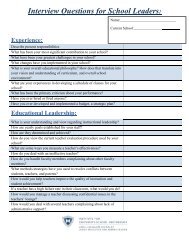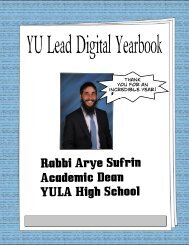Notes1. Before cont<strong>in</strong>u<strong>in</strong>g, I suggest that readers self-adm<strong>in</strong>ister a few of thequestionnaires as are relevant <strong>in</strong> Appendices B, C, D, E, <strong>and</strong>/or F. Do<strong>in</strong>g sowill serve as an advanced organizer of sorts for the material to follow, butwill also serve as a personal spot-check of one’s awareness <strong>and</strong> knowledge ofideas advocated <strong>in</strong> this monograph.2. I have culled these excerpts from the literature on the school pr<strong>in</strong>cipalship<strong>and</strong> use the term “pr<strong>in</strong>cipal” as it is utilized <strong>in</strong> the literature on <strong>in</strong>structionalleadership. I realize, of course, that <strong>Jewish</strong> day school <strong>and</strong> yeshiva leaders arereferred to <strong>in</strong> various ways (not always consistently), at least <strong>in</strong> terms of jobdescriptions. Yet, this review of the literature is relevant to all <strong>Jewish</strong> schoolleaders, regardless of title. If a nuanced difference is important, I will <strong>in</strong>sert acomment when appropriate. Cf. n. 9 below.3. Why have so many <strong>Jewish</strong> schools been immune to the latest cutt<strong>in</strong>g edge<strong>in</strong>structional practices? Draw<strong>in</strong>g from the classic work of Lortie (2002) <strong>and</strong>more recently ideas from Hargreaves <strong>and</strong> Shirley (2009, also cited byMarshall, 2009), I feel <strong>Jewish</strong> school leaders, <strong>in</strong> particular, share threecharacteristics: (1) presentism - a short-term perspective that prevents themfrom envision<strong>in</strong>g or plann<strong>in</strong>g collaboratively for long-term systemic change;(2) conservatism – a mistrust of reform <strong>in</strong>itiatives <strong>and</strong> a reluctance to changefamiliar classroom practices, even <strong>in</strong> the face of research f<strong>in</strong>d<strong>in</strong>gs <strong>and</strong> pupillearn<strong>in</strong>g outcomes suggest<strong>in</strong>g that better approaches are needed; <strong>and</strong> (3)<strong>in</strong>dividualism – <strong>Jewish</strong> leaders often work <strong>in</strong> isolation from colleagues <strong>and</strong>such isolation may result <strong>in</strong> lower levels of self-efficacy, less relational trust,<strong>and</strong> lack of awareness of other best practices. This lack of trust,parenthetically, also extends to those of us who teach at the university level.The perception is that we are not practitioners, although most of us havebeen teachers <strong>and</strong> adm<strong>in</strong>istrators, <strong>and</strong> that s<strong>in</strong>ce we deal <strong>in</strong> “theory” we havelittle to offer <strong>in</strong> terms of <strong>in</strong>sights <strong>in</strong>to practice. Such dichotomous th<strong>in</strong>k<strong>in</strong>gthat theory <strong>and</strong> practice are bifurcated is myopic <strong>and</strong> imprecise. Toparaphrase, Kurt Lew<strong>in</strong>, “There is no good theory without practice as there isno good practice without theory.” Practitioners are ill-<strong>in</strong>formed if they th<strong>in</strong>kthat what they do <strong>in</strong> the classroom is not <strong>in</strong>formed by some theory orresearch. Adm<strong>in</strong>istrators <strong>in</strong> <strong>Jewish</strong> schools <strong>and</strong> not unlike many <strong>in</strong> the publicsector, it seems to me, rely on entrenched practices of the past (Pomson,2002). Learn<strong>in</strong>g is viewed as predictable, simple, <strong>and</strong> undifferentiated.Teach<strong>in</strong>g is seen as master<strong>in</strong>g rout<strong>in</strong>e behaviors, not <strong>in</strong>formed throughreflective judgments. Supervision is practiced through re<strong>in</strong>forc<strong>in</strong>g prescribed86
teacher behaviors <strong>and</strong> skills, not help<strong>in</strong>g teachers discover <strong>and</strong> constructprofessional knowledge <strong>and</strong> skills through <strong>in</strong>structional dialogue <strong>and</strong>reflection. Teachers <strong>and</strong> supervisors are viewed as bureaucratic functionaries,isolated <strong>and</strong> <strong>in</strong>dependent rather than collegial team members. F<strong>in</strong>ally,schools are viewed as bureaucracies rather than democratic learn<strong>in</strong>gcommunities (Pajak, 2008).4. My guess is that most readers, read<strong>in</strong>g this last sentence did not react tothe choice of words I employed, but I will not use the word “tra<strong>in</strong>ed” aga<strong>in</strong><strong>in</strong> this monograph because as one of my mentors, O.L. Davis, Jr., (cited <strong>in</strong>Spearman, 2009) states “you tra<strong>in</strong> dogs, you educate teachers.” Avoidance ofthe word “tra<strong>in</strong>ed” is not simply an exercise <strong>in</strong> semantics, but rather <strong>in</strong>dicatesthe true nature <strong>and</strong> power of education. Professional development, for<strong>in</strong>stance, is not tra<strong>in</strong><strong>in</strong>g, but rather stimulat<strong>in</strong>g <strong>and</strong> develop<strong>in</strong>g the m<strong>in</strong>ds ofthose who work with our children. Education, as opposed to tra<strong>in</strong><strong>in</strong>g, is an<strong>in</strong>tellectually challeng<strong>in</strong>g, creative, <strong>and</strong> collaborative process. In the field ofeducation, we do not “tra<strong>in</strong>,” we educate (see, e.g., Holcomb, 1994).5. The pr<strong>in</strong>cipal must play an active, ongo<strong>in</strong>g role <strong>in</strong> <strong>in</strong>structional leadership.Notwithst<strong>and</strong><strong>in</strong>g the comprehensive study,”Mak<strong>in</strong>g Sense of Lead<strong>in</strong>g<strong>Schools</strong>: A Study of the School Pr<strong>in</strong>cipalship” (www.Crpe.org) that <strong>in</strong>dicatedthat pr<strong>in</strong>cipals do not necessarily have to have expertise <strong>in</strong> all areas (e.g.<strong>in</strong>structional, cultural, managerial, human resources, strategic, externaldevelopment, micro political leadership), they must be master“diagnosticians,” able to provide the school what it needs at the right time<strong>and</strong> <strong>in</strong> the right context. I ma<strong>in</strong>ta<strong>in</strong> that <strong>in</strong>structional leadership isqualitatively different from other forms of leadership. Although it is difficultto separate one form of leadership from another, s<strong>in</strong>ce they all form anundifferentiated whole, <strong>in</strong>structional leadership cannot be delegated toothers.6. What is the relationship among <strong>in</strong>structional leadership, supervision, <strong>and</strong>professional development, three concepts I have alluded to thus far <strong>in</strong> themonograph? Briefly, <strong>in</strong>structional leadership is a generic term used <strong>in</strong> theliterature to <strong>in</strong>dicate a school leader’s responsibility to lead <strong>in</strong>structionalimprovement <strong>in</strong> a school. To achieve <strong>in</strong>structional improvement one mustutilize the tools or approaches of <strong>in</strong>structional leadership that <strong>in</strong>clude, amongothers to be discussed <strong>in</strong> this monograph, supervision, professionaldevelopment, <strong>in</strong>duction, mentor<strong>in</strong>g, action research, peer coach<strong>in</strong>g, etc.However, some <strong>in</strong> the field consider supervision a subset of professionaldevelopment. Given the sometimes negative connotations associated with theterm “supervision,” I, too, subsume supervision under the more palatable87
- Page 1 and 2:
Improving InstructionalQuality in J
- Page 4 and 5:
Appendix C: Assessing Your Role as
- Page 6 and 7:
others, involved in a cognate enter
- Page 8 and 9:
Weissberg, Walberg, & Wang., 2004).
- Page 10 and 11:
all. “We are never asked for what
- Page 12 and 13:
administrator. He was well-organize
- Page 14 and 15:
Sartoris, DiPrima Bickel, & Garnier
- Page 16 and 17:
grade conferences, etc., effective
- Page 18 and 19:
school’s teaching practices, the
- Page 20 and 21:
een made in the areas of science an
- Page 22 and 23:
learning is more likely to occur th
- Page 24 and 25:
content, and the need to ensure tha
- Page 26 and 27:
pattern.] I didn’t really realize
- Page 28 and 29:
constraints, increase in administra
- Page 30 and 31:
The Transformational Change Project
- Page 32 and 33:
that are not strategic, but episodi
- Page 34 and 35:
my personal involvement in work wit
- Page 36 and 37:
schools to even greater levels of s
- Page 38 and 39:
was: “Well, you know, finding tim
- Page 40 and 41:
called direct teaching), although e
- Page 42 and 43: surprised when no one can answer
- Page 44 and 45: RecommendationsI. Teaching1. Teache
- Page 46 and 47: standards,” a significant opportu
- Page 48 and 49: decide on an area or theme they’d
- Page 50 and 51: • Reflective journaling - Another
- Page 52 and 53: 3. Deep instructional improvement v
- Page 54 and 55: Instructional leadership is about e
- Page 56 and 57: 76). Teachers who employ instructio
- Page 58 and 59: short answers to two questions. The
- Page 60 and 61: may become involved in cooperative
- Page 62 and 63: utilized within a differentiated le
- Page 64 and 65: Research-Based Teaching Practices i
- Page 66 and 67: curriculum? Schools, in my view, to
- Page 68 and 69: learning objectives have been ident
- Page 70 and 71: Developing curriculum at the planni
- Page 72 and 73: 4) Emphasize both the academic and
- Page 74 and 75: An Overview of Best Practices in Su
- Page 76 and 77: with practices best suited to promo
- Page 78 and 79: dialogue and meaningful supervision
- Page 80 and 81: • Ongoing - Too much of professio
- Page 82 and 83: to do so. In fact, utilizing in-sch
- Page 84 and 85: greatly to meaningful supervision a
- Page 86 and 87: and amplified by James MacGregor Bu
- Page 88 and 89: Leadership is predicated on the fou
- Page 90 and 91: Citing Jim Collins (2002 cited by F
- Page 94 and 95: ubric of “professional developmen
- Page 96 and 97: throughs, explains that according t
- Page 98 and 99: members are not fully cognizant or
- Page 100 and 101: AcknowledgementsI thank all the ind
- Page 102 and 103: Bass, B. M. (1985). Leadership and
- Page 104 and 105: Burke, P. J., & Krey, R. D. (2005).
- Page 106 and 107: Downey, C. J., Steffy, B. E., Posto
- Page 108 and 109: Fullan, M. (2005). Leadership and s
- Page 110 and 111: Good, T., & Brophy, J. E. (2007). L
- Page 112 and 113: Johnson, C. C., & Fargo, J. D. (201
- Page 114 and 115: Marzano, R. J., & Brown, J. L. (200
- Page 116 and 117: Popham, W. J. (2008a). Classroom as
- Page 118 and 119: Shapira-Lishchinsky, O. (2009). Isr
- Page 120 and 121: Tschannen-Moran, M., & McMaster, P.
- Page 122 and 123: Annotated Works on Instructional Le
- Page 124 and 125: This volume is an inspiring introdu
- Page 126 and 127: you want to learn how to teach stud
- Page 128 and 129: AppendicesAppendix A: Instructional
- Page 130 and 131: Suggested responses:1. To be effect
- Page 132 and 133: Appendix C: Assessing Your Role as
- Page 134 and 135: SA A D SD 3. My spoken language as
- Page 136 and 137: Domain 2: The Classroom Environment
- Page 138 and 139: SA A D SD 13. I have a well-defined
- Page 140 and 141: SA A D SD 13. I rarely desire to se
- Page 142 and 143:
20. This is a well managed school.
- Page 144 and 145:
Appendix F: Teacher Attitude Questi
- Page 146:
41. My colleagues and I usually dis


